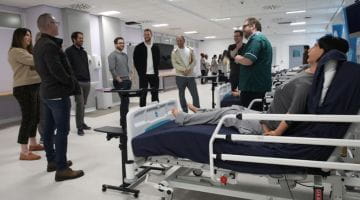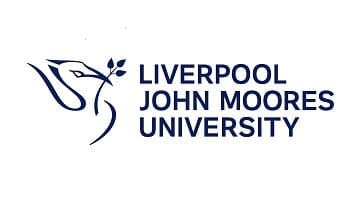About this course
Gain hands-on lab experience, carry out novel research and enjoy excellent employment prospects on the MSc Drug Discovery, Development and Delivery.
- Explore the process of discovery and development of new drugs and the quality control aspect of the pharmaceutical industry as you train to become a qualified pharmaceutical scientist
- Gain hands-on experience in relevant laboratory techniques with a 12 week research project
- Benefit from LJMU's £12 million investment in state-of-the-art laboratory facilities
- Enjoy excellent graduate employment prospects
This new course has been developed in association with industry leaders and promotes a critical awareness of the most recent advances in the field of Drug Discovery, Development and Delivery.
This programme is aimed at chemists and graduates with a chemistry background who have a passion for drug creation and at industrialists interested in moving newly developed drugs into the mass manufacturing arena. The course offers an integrated, stimulating and challenging programme of study, informed by contemporary research and responsive to the changing nature of the pharmaceutical industry.
Experienced course tutors offer specialist training in preparation for careers in the diverse areas of the pharmaceutical industry.
You will learn to use industry-standard apparatuses, including chromatographic equipment and spectrometers, tableting and particle sizing equipment, computing laboratory, molecular modelling software and thermal analysis equipment — including dynamic differential scanning calorimetry — plus chromatography, LC-MS and NMR instruments.
Course modules
Discover the building blocks of your programme
This course is currently undergoing its scheduled programme review, which may impact the advertised modules. Programme review is a standard part of the University’s approach to quality assurance and enhancement, enabling us to ensure that our courses remain up to date and maintain their high standard and relevancy.
Once the review is completed, this course website page will be updated to reflect any approved changes to the advertised course. These approved changes will also be communicated to those who apply for the course to ensure they wish to proceed with their application.
Your programme is made up of a number of core modules which are part of the course framework. Some programmes also have optional modules that can be selected to enhance your learning in certain areas and many feature a dissertation, extended report or research project to demonstrate your advanced learning.
Further guidance on modules
Modules are designated core or optional in accordance with professional body requirements, as applicable, and LJMU’s Academic Framework Regulations. Whilst you are required to study core modules, optional modules provide you with an element of choice. Their availability may vary and will be subject to meeting minimum student numbers.
Where changes to modules are necessary these will be communicated as appropriate.
Core modules
Optional modules
Your Learning Experience
An insight into teaching on your course
Study hours
In semester 1 the majority of teaching will take place on Mondays, Tuesdays and Wednesdays and in semester 2 on Mondays, Tuesdays and Thursdays. The taught sessions of the Research Methods module only runs weeks 1-6. All 20-credit core modules feature 40-45 hours scheduled activities, which you are expected to attend. For the research project (which runs May to August) you will be expected to attend full time i.e. 9.00am-5.00pm.
Teaching methods
The stimulating and challenging curriculum is delivered through lectures, tutorials, workshops, seminars, laboratory work and a four month research project with expert supervision.
Applied learning
This course includes a 12 week, full-time research project. During your independent research project, you will be appointed a LJMU-based Supervisor and an Industrial Supervisor if you are carrying out your project externally.
How learning is monitored on your programme
To cater for the wide-ranging content of our courses and the varied learning preferences of our students, we offer a range of assessment methods on each programme.
Achievement of the learning outcomes will be assessed through written examinations, written assignments, oral presentations and formative VLE interactive self-assessments.
Where you will study
You will study at the Byrom Street site in the University's City Campus. With an ongoing £12 million investment in laboratory facilities here and state-of-the-art research facilities in the newly developed Life Sciences building, you'll enjoy a first class study environment.
Career paths
Further your career prospects
LJMU has an excellent employability record with 96% (HESA 2018) of our postgraduates in work or further study six months after graduation. Our applied learning techniques and strong industry connections ensure our students are fully prepared for the workplace on graduation and understand how to apply their knowledge in a real world context.
The programme offers cutting-edge, research-based training to enable you to become a qualified pharmaceutical scientist ready for employment in the pharmaceutical and related industries. The course is ideal if you want to work in drug discovery, development and manufacturing. You can look forward to excellent employment prospects in roles within drug design, lead compound discovery, formulation science, process development and product manufacture at large pharmaceutical companies, as well as specialist small and medium sized enterprises.
Tuition fees and funding
- Fee:
- £10,705
Fees
The fees quoted above cover registration, tuition, supervision, assessment and examinations as well as library membership and student IT support with access to printed, multimedia and digital resources including programme-appropriate software and on campus wifi.
Financial Support
There are many ways to fund postgraduate study for home and international students. From loans to International Scholarships and subject-specific funding, you’ll find all of the information you need on our specialist postgraduate funding pages. The University offers a range of financial support for students. You'll find all the information you need on our specialist financial support pages including details of the Student Support Fund and other activities to support with the cost of living.
Additional Costs
In addition to fees, students should also keep in mind the cost of:
- Accommodation
- Travel costs and field trips unless paid for by LJMU
- Stationery, IT equipment, professional body membership and graduation gown hire
Entry requirements
You will need:
Qualification requirements
How to apply
Securing your place at LJMU
To apply for this programme, you are required to complete an LJMU online application form. You will need to provide details of previous qualifications and a personal statement outlining why you wish to study this programme.
Your university life
From accommodation and academic support to clubs and societies. Find out what LJMU has to offer.
Related Links
Talk to our students
Connect with a current LJMU student for advice and guidance on university life, courses and more.
See what our students are saying
At LJMU we want you to know you’re making the right choice by studying with us. You can see what our students are saying about their experience with us through their reviews on the following websites:
Related Links
News and views
Browse through the latest news and stories from the university
The University reserves the right to withdraw or make alterations to a course and facilities if necessary; this may be because such changes are deemed to be beneficial to students, are minor in nature and unlikely to impact negatively upon students or become necessary due to circumstances beyond the control of the University. Where this does happen, the University operates a policy of consultation, advice and support to all enrolled students affected by the proposed change to their course or module.





























.png)
